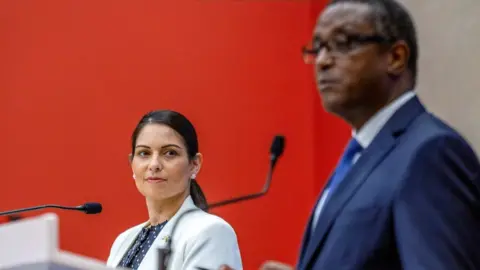Rwanda asylum critics have no solutions, says Patel
 Reuters
ReutersHome Secretary Priti Patel has hit back at critics of the government's plan to send asylum seekers to Rwanda, saying they have failed to offer solutions.
Writing in the Times with the Rwandan foreign minister, she said they had proposed an innovative answer to the "deadly trade" of people-smuggling.
No "humanitarian nation" could allow that suffering to continue, they said.
It comes after Archbishop of Canterbury Justin Welby said there were "serious ethical questions" about the plan.
To push the scheme through, Ms Patel issued a ministerial direction - meaning she took responsibility for the policy - after her top civil servant questioned whether it offered value for money.
Ms Patel and Vincent Biruta, Rwanda's foreign minister, said the global asylum system was "collapsing" under the strain of humanitarian crises and human trafficking.
The plan to transport some asylum seekers who enter the UK unlawfully to Rwanda, where they can apply to settle, will allow people fleeing persecution to find safety, they said.
And they added that the UK's investment in Rwanda - an initial £120m - would help to address the lack of opportunities which drive economic migration.
"We are taking bold and innovative steps and it's surprising that those institutions that criticise the plans fail to offer their own solutions," they wrote.
"Allowing this suffering to continue is no longer an option for any humanitarian nation."
It also emerged that some refugees in Rwanda will be sent to the UK under the terms of the two nations' agreement.
A UK government source told the BBC that it would be supporting Rwanda to resettle "a portion of the most vulnerable refugees".
The scheme will initially focus mainly on single men arriving in the UK on small boats or lorries. Those sent to Rwanda will be provided with accommodation while their asylum claims are considered.
If successful they will be able to remain in the east African nation.
Energy minister Greg Hands told Times Radio sending migrants to Rwanda would be a "significant deterrent" to people attempting to cross the Channel in small boats. He said the government was "confident" that the policy would work.
Two boats carrying 76 people were brought into Dover, Kent, on Sunday, the Home Office said, while a further two small boats were seen being brought ashore on Monday.
On Easter Sunday, Mr Welby became the latest figure to criticise the plan, accusing the government of "subcontracting our responsibilities" and saying it cannot "stand the judgment of God".
He was joined by the Archbishop of York, Stephen Cottrell, who said the policy was "depressing and distressing", adding: "We can do better than this."
Opposition parties and some Conservative MPs have also criticised the plan, while more than 160 charities and campaign groups called it "shamefully cruel" and urged the prime minister and Ms Patel to scrap it.
Labour leader Sir Keir Starmer described the scheme as "unworkable", while the Liberal Democrats said the government was "slamming the door" in the face of refugees and the SNP's Ian Blackford called it "absolutely chilling".
Among their concerns was Rwanda's own human rights record, with the UK having raised allegations of extrajudicial killings, disappearances and torture in the east African nation at the UN last year.
But in their Times article, Ms Patel and Mr Biruta said Rwanda "ranks as one of the world's safest countries" and has already accommodated 130,000 refugees from multiple countries.
While they said the plan would "deter migrants from putting their lives at risk" by making dangerous journeys, a letter from the Home Office's top official said evidence for a deterrent effect was "highly uncertain".
Permanent Secretary Matthew Rycroft warned the policy had a high cost and would only be value for money if it reduced the number of Channel crossings and other illegal entries to the UK.
While the UK is investing £120m into the "economic development and growth of Rwanda" as part of the deal, the government said funding would also be provided to support asylum operations, accommodation and integration which would be "similar to the costs incurred in the UK for these services".
The Times has reported a cost of £20,000 to £30,000 for each migrant sent to Rwanda.
Labour's Dame Meg Hillier, chair of the Public Accounts Committee, told BBC Radio 4's Today programme it was "highly unusual" in the Home Office for a ministerial direction to be issued.
She said if a policy is drawn up "at the last minute" it can be difficult to prove its monetary value but as the idea of processing asylum seekers abroad had been discussed by the government for some time, she said she would be interested to see the "accounting for it".

- 'YOU ONLY WANTED ONE THING: TO LIVE': How one remarkable German football fan survived the Holocaust
- BRITAIN IS FEELING THE SQUEEZE: Coping with the cost of living crisis

